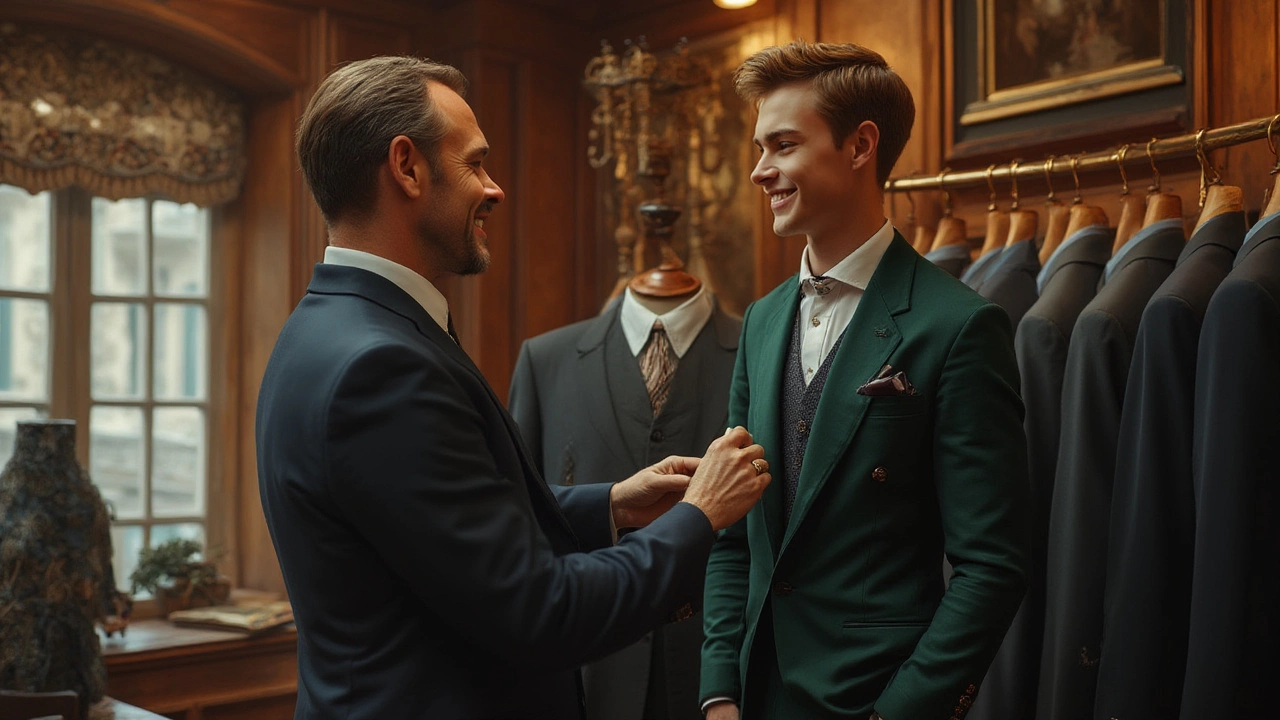Straight up—there’s nothing quite like that first step out of a shop or a tailor’s studio in Ireland, fitted suit hung over your arm or easing onto your shoulders. For anyone here—locals, blow-ins, or lads prepping for a major occasion—the question always starts with, “How much is this going to set me back?” The Irish suit game is equal parts tradition and savvy spending, where you’ve got the old-school tailoring of Dublin and Cork but also high-street bargains or splurges for race days at Punchestown. If you’re serious about looking sharp, and you want to know exactly what you should spend in the Irish market, don’t let yourself get bamboozled by vague ballpark figures. Real euros, local brands, and no-nonsense advice—let’s pull back the curtain on suits in Ireland.
What Should a Fitted Suit Cost in Ireland?
Walk down Grafton Street or St. Patrick’s Street and take a look at the window displays in the likes of Louis Copeland, Magee 1866, or even Marks & Spencer—suit prices swing from staggeringly affordable to jaw-dropping luxury. For many, the immediate draw is high-street brands. Here, you can score off-the-peg suits for special offers: think €180 at Dunnes Stores, €250 at Next, or maybe €300-350 at Moss Bros. These suits work for first jobs or unexpected occasions but don’t expect miracles with the fit. If your suit budget hovers under €400, you’ll need alterations and you won’t get Irish wool or anything handmade. If you want to dip your toes into tailoring—proper measurements, real attention to detail—prices in Ireland usually start at €600 for a made-to-measure suit, and this is for reputable places, not just cut-and-sew shops. Magee 1866’s entry-level tailored suits in Donegal will set you back around €700, while Louis Copeland & Sons in Dublin, guardians of old Irish tailoring, charge closer to €900+. Go bespoke and you’ll cross the €1,200 line pretty fast—the ceiling is as high as you’re willing to go. Suits for weddings, racings days, and big corporate moves? Most Irish lads spend between €400 and €1,200, with €650 the average sweet spot in 2025. Here’s a peek at real Irish price ranges:
| Type | Average Starting Price (€) | Where To Buy |
|---|---|---|
| High Street (Ready-To-Wear) | 180-400 | Dunnes, Next, Marks & Spencer |
| Made-To-Measure | 600-900 | Magee 1866, Louis Copeland, McKenna Man |
| Bespoke | 1200+ | Louis Copeland, Tom Murphy Cork |
Keep in mind, these aren’t made-up numbers—they’re averages from shops as of July 2025. Pro tip: July and January sales can save you 20-30% at places like Brown Thomas. Last-minute wedding panic? Renting a sharp suit at Black Tie in Dublin starts around €120 for a weekend, but nothing beats your own threads that fit just right.
Irish Tailoring: Regional Differences and What to Expect
Ireland isn’t just Dublin, and suits aren’t all cut from the same cloth. Dublin tailoring has a long-standing reputation—think Louis Copeland, credited with dressing everyone from Irish presidents to rugby captains. Walk into a tailor off Exchequer Street looking for bespoke, and expect precise measurements, second fittings, and chats over fabrics grown and spun in Donegal. In Cork, legends like Tom Murphy will walk you through Italian and Irish wools, often with a cheeky story about GAA stars or Munster rugby players who’ve stood on the same spot. Outside the big cities—Galway, Limerick, Waterford—prices can drop by 10-20%, but you might not find as massive a fabric selection. Your choices also depend on your local culture; in Galway, for example, wedding suits often lean towards brighter tweeds with flecks of colour, matching Connacht’s wild landscape. Country weddings love earthy textures. Rural tailors may source Donegal tweed directly, while city suits favour sleek navy and charcoal. One thing runs through it all: there’s a growing pride in Irish fabrics, with more people here looking past imported polyester and chasing sustainability via native wool. Farmers’ markets in Clare or Meath, and pop-ups at fairs, sometimes host tailors who offer locally sourced, slightly quirky options for under €800—don’t overlook the countryside for something with real character.

Tailored Suit Shopping: Key Tips for Irish Buyers
Worried about wasting money? You’re not alone. Start by being honest about why you need the suit. One-off for a big wedding, the same suit for work, or are you going to multiple events or formal gigs? If it’s a rare wear, don’t break the bank—a solid ready-to-wear in a neutral colour and fit altered locally by a place like Dublin’s The Zip Yard (roughly €50 for basic adjustments) can look smashing. Planning on repeated use? Invest in better fabric and measurements. Irish summers might be famously damp, but a summer wedding is still likely to need lighter material—wool-mohair blends breathe better for July or August. Don’t just grab the first navy you see; Irish shops now stock real Donegal tweed, super 100’s wool, and even eco-friendly options spun in Mayo or Down. Bring your own shirt, shoes, and tie to fittings. That way you’ll see the full look with Irish lighting (let’s be honest: nothing looks the same under October rain clouds as it does under shop fluorescents). When negotiating, don’t feel shy to ask for package deals: two suits together or adding in an extra pair of trousers can yield 10-15% savings. Young lads heading to Debs often get a deal if three or four friends show up together—worth thinking about if you want matching threads in Westmeath or Carlow. It helps to ask for recommendations from real-life Irish people dealing with the same climates, commute, and pub culture.
What Impacts the Price? Irish Fabrics, Labour, and Trends
Have you ever wondered why a suit from a high street chain in Ireland costs a fraction of what you’ll pay down the road at a heritage tailor? Most of the difference comes down to fabric. Cheap suits use blends heavy on polyester so they keep costs down and stay crease-free after a bus ride from Bray to the city, but they’ll never feel like pure Irish wool hand-woven in Donegal. As the Irish Times fashion columnist John Redmond puts it:
“A proper suit—one cut for your shape and stitched with real Irish tweed—carries a sense of place and dignity you won’t get off a hanger.”Labour’s the next big cost. Creating a pattern for your body, cutting and hand-finishing—it takes time, skill, and someone willing to chat through a lunch break to get it right. Imported suits or made-to-measure sent overseas might save you €200, but lose that personal Irish touch. Trends also play a part: right now, three-piece suits are roaring back in Dublin and Cork for both weddings and races. There’s a spike in bold linings—think green paisley or polka-dots—nodding to contemporary Irish flair, adding €50-100 depending on the tailor. Supply and demand aren’t ignored either: around university graduation or Debs season, prices sneak up. And don’t discount events like Galway Races or the Listowel Harvest Festival—tailors know when demand peaks and prices climb. Want something nobody else has? Expect bespoke pricing, or gamble on local up-and-coming designers experimenting with modern twists at Temple Bar’s pop-up shops—sometimes you can bag limited-run suits for €700 or less, plus the story to go with it.

When To Splurge and When To Save: Making the Right Choice in Ireland
If you’re prepping for a once-in-a-lifetime event (your wedding, a child’s Christening, that long-anticipated corporate job interview in Dublin’s docklands), it’s worth digging a little deeper into your wallet. The right fit and fabric might mean you spend €900 instead of €400, but you’ll have a suit that still turns heads at a cousin’s wedding in five years’ time. Classic navy and mid-grey work for most occasions, but don’t underestimate a bold tweed for a day at the Curragh or Fairyhouse. For those tight on budget, ready-to-wear is grand if you nail the fit post-purchase. Grab professional alteration and spend the savings on a good shirt and shoes—please don’t pair a €500 suit with €30 pleather loafers. Irish advice: always try the suit on and sit down, move your arms, do a quick jig. If you’re sweating in the changing room, it’ll feel worse after 12 hours at a wedding next July in Killarney. Hunt for seasonal sales at Brown Thomas or Arnotts—sometimes classic suits go for 30% off in August as the crowd scrambles for tartan patterns for Christmas. Renting is totally acceptable for those who want flash without the financial hangover, with pop-ups in Limerick, Galway, and Waterford for quick options. Still, your own fitted suit carries a special confidence—and in Ireland, where tradition, personal style, and practicality mix every day, that’s worth its weight in wool. Start with your needs, shop smart, and maybe take a cue from the best-dressed at the Galway Races: own your style, but let Irish craft guide you.
